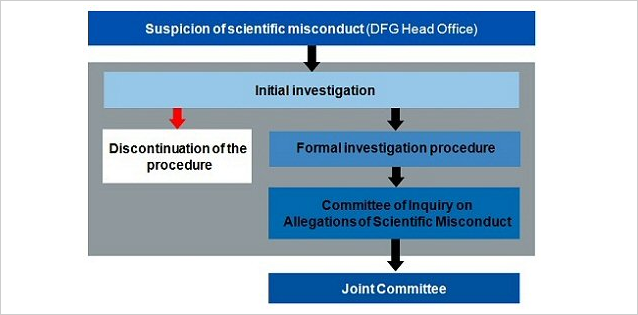The DFG procedure in cases of suspected scientific misconduct
Observance of the rules of good scientific practice is the basis of trustworthy research. The DFG therefore sets forth rules of procedure for dealing with cases of suspected research misconduct within its area of responsibility. In doing so, the DFG also assumes accountability for the funds entrusted to it.
Based on its own Rules of Procedure for Dealing with Scientific Misconduct (VerfOwF), the DFG conducts a two-stage process to investigate scientific misconduct.
This two-step process consists of a non-formal stage, the so-called initial investigation conducted by the DFG Head Office, and a formal stage involving the DFG Committee of Inquiry on Allegations of Scientific Misconduct.
The DFG procedure upholds the principles of a fair and confidential process. The principle of the presumption of innocence explicitly applies.
The proceedings involve allegations of scientific misconduct on the part of the following:
1. grant applicants,
2. grant recipients,
3. individuals with a high level of scientific/academic responsibility in funding proposals submitted by higher education institutions or non-university research institutions,
4. reviewers in DFG review processes and
5. members of DFG committees or bodies supported by the DFG (in administering funding instruments) who participate in advisory, review, evaluation and decision-making procedures.

If concrete suspicions of scientific misconduct become known within the DFG Head Office, the Research Integrity Team carries out an initial investigation.
If the initial investigation does not provide sufficient confirmation that scientific misconduct occurred, the Research Integrity Team discontinues the procedure.
Discontinuation on the grounds of so-called insignificance can be considered if a minor case of scientific misconduct has been established and the person concerned has contributed significantly to resolving the matter – in particular if they take action according to item III. 3. c) VerfOwF, such as by publishing an erratum, or if they have already taken action to remedy damage.
If discontinuation of the procedure is not an option, the initial investigation is transferred to the formal investigation conducted by the Committee of Inquiry on Allegations of Scientific Misconduct.
The Committee of Inquiry on Allegations of Scientific Misconduct, a so-called subcommittee of the Joint Committee, is made up of eight scientific members representing the fields of humanities, social sciences, natural sciences, life sciences and engineering sciences.
The Committee deliberates in closed session. The researcher who is accused of misconduct is given an appropriate opportunity to comment and is heard orally on request; for this purpose, they may involve a person of their confidence as an adviser. The Committee examines whether scientific misconduct has occurred by freely assessing the evidence. If the majority of the Committee considers misconduct to be sufficiently proven and believes action is necessary, it submits the result of its investigation to the Joint Committee with a proposal for a decision. Otherwise, the proceedings are discontinued.
Depending on the nature and severity of the misconduct, the Joint Committee may decide, among other things, to exclude applicants from DFG funding eligibility for a number of years, to revoke or withdraw funding decisions, or to exclude individuals from DFG bodies and committees.


